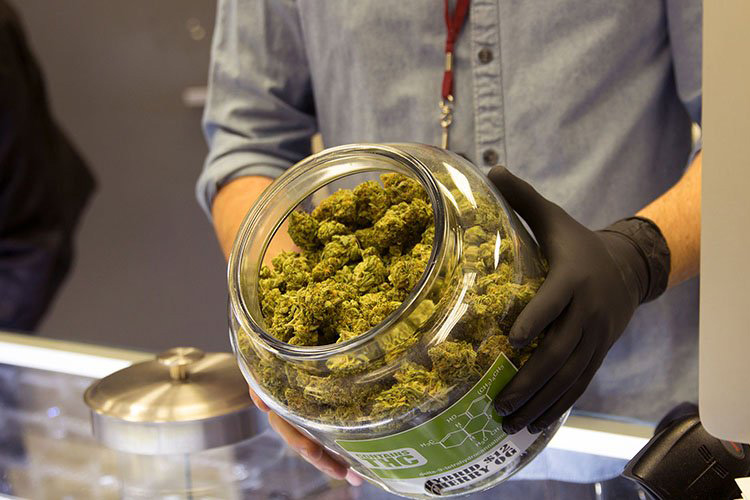House committee gave preliminary approval Wednesday to a comprehensive marijuana reform bill that would decriminalize the drug while erasing pot convictions stretching back decades.
The vote by the House Judiciary Committee came the same day that a new poll showed a slim majority of Arizonans support legalization of marijuana for recreational use in the state, the subject of initiative pushes for the 2020 election.
Those initiatives may yet be needed: Republican lawmakers on the House committee Wednesday predicted that while the Marijuana Opportunity Reinvestment and Expungement Act will pass the House, it has almost no chance in the Senate in its current form.
“That’s the thing about the Senate. They will do nothing,” said Rep. Ken Buck, R-Colo. “I would love to work with the chair, I would love to have my staff work with the chair on at least moving some parts of this marijuana issue.”
But supporters said the MORE Act is a long overdue response to what they said has been a failed War on Drugs, a war that has disproportionately hit low-income and minority communities.
“For far too long, we have treated marijuana as a criminal justice problem instead of a matter of personal choice and public health,” said Rep. Jerry Nadler, D-N.Y.
“Whatever one’s views are on the use of marijuana for recreational or medicinal purposes – arresting, prosecuting, and incarcerating users at the federal level is unwise and unjust,” said Nadler, the bill’s lead sponsor.
Views in Arizona appear to be leaning toward decriminalization, according to a poll released Wednesday by OH Predictive Insights.
That online poll of 900 registered voters found that 54% approve of recreational marijuana use for adults in Arizona compared to just 33% who opposed it. Support was higher in the state’s urban areas and among Democrats and respondents under age 55.
The survey was conducted from Oct. 31 to Nov. 8 and had a margin of error of plus or minus 3.27%.
Arizona is one of 22 states that allow medical marijuana, but efforts to approve recreational marijuana in the state have failed at ballot box, most recently in 2016.
“Eleven states currently have legalized marijuana for adult use and with an expected high turnout election in 2020 – there is a decent chance Arizona becomes number 12 based on these latest numbers,” said Mike Noble, chief of research for OH Predictive Insights, in a statement with the survey.
Even though the state allows medical marijuana, penalties for possession of non-medical marijuana are still on the books, with sentences ranging from 6 months for simple possession to 10 years for possession of large amounts for sale.
Two proposed initiatives for the 2020 ballot in Arizona would legalize marijuana and other drugs in the state, while a third would decriminalize and tax the drug.
But the federal bill approved by the Judiciary Committee Wednesday on a 24-10 vote would go much further.
The bill would remove marijuana from Schedule 1 of the Drug Enforcement Administration’s list of controlled substances, where it has been listed since 1970. And it would be retroactive, clearing the way for federal criminal marijuana convictions since 1971 to be expunged.
The bill also calls for an excise tax on cannabis sales to fund health and substance abuse programs, assistance for prisoners re-entering society and legal aid for criminal cases. The funds would also be used as grants to support cannabis businesses, with special attention to minority business owners.
The bill has 57 co-sponsors, including Rep. Raul Grijalva, D-Tucson, and Rep. Ruben Gallego, D-Phoenix. It passed the committee on a largely partisan vote, with Arizona Rep. Greg Stanton, D-Phoenix, voting for it and Rep. Debbie Lesko, R-Peoria, voting against it. Lawmakers said they expect it will pass the Democrat-controlled House when it comes up for a vote.
Republicans on the committee said the bill tries to do too much, making it a tough sell not only in the Senate but to the public.
“For 70, 80 years, the American public have been told that marijuana is bad,” said Rep. Doug Collins, R-Ga. “It (the bill) has a lot of moving parts and a lot of moving areas. Do we want to accomplish something or do we want to make a political statement?”
But Rep. Cedric Richmond, D-La., said it was important to provide treatment services in communities most affected by the war on drugs, as the damage done on lower-income communities is still being felt.
“For those of us that were in those communities when the failed war on drugs started, we know the damage that was done and we know the many collateral consequences people faced because of it,” Richmond said.
Story by Heather Cumberledge and Wissam Melhem, Cronkite News




